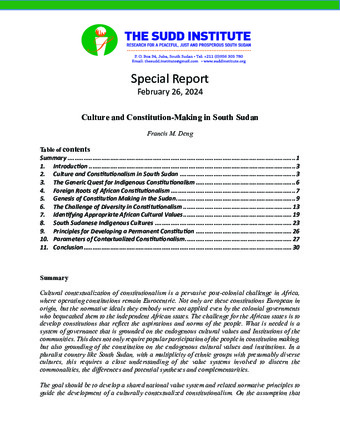Culture and Constitution-Making in South Sudan
Publication Summary
Cultural contextualization of constitutionalism is a pervasive post-colonial challenge in Africa, where operating constitutions remain Eurocentric. Not only are these constitutions European in origin, but the normative ideals they embody were not applied even by the colonial governments who bequeathed them to the independent African states. The challenge for the African states is to develop constitutions that reflect the aspirations and norms of the people. What is needed is a system of governance that is grounded on the endogenous cultural values and Institutions of the communities. This does not only require popular participation of the people in constitution making, but also grounding of the constitution on the endogenous cultural values and institutions. In a pluralist country like South Sudan, with a multiplicity of ethnic groups with presumably diverse cultures, this requires a close understanding of the value systems involved to discern the commonalities, the differences and potential syntheses and complementarities.
The goal should be to develop a shared national value system and related normative principles to guide the development of a culturally contextualized constitutionalism. On the assumption that there is much in common in the fundamental cultural values of the South Sudanese ethnic groups, a culturally centered constitution might include the following guiding principles:
- Stating in the preamble the overriding importance of culture as a source of inspiration and guidance in the construction and functioning of state institutions and decision-making processes to consolidate independence, promote an endogenous state and generate a self-sustaining process of nation-building with confidence, dignity, and national pride.
- Enshrining various forms of consensus-building approaches in decision making, including the prevention, management, and resolution of conflicts and the sharing of power and resources based on constructive management of diversity aimed at inclusivity, equality and dignity for all ethnic groups to promote national unity, harmony, and solidarity.
- Ensuring the democratic choice of the people of their leaders through a culturally oriented system of elections that balances majority rule with deferential recognition and accommodation of minorities in the government.
- Respecting the dignity of every individual and group by stipulating a Bill of Rights based on core elements of the African values and normative principles that balance the rights and duties of the individual with those of the community, building on the African Charter of ‘human and people’s rights;’
- Adopting an enhanced form of decentralization that devolves power to the local communities as a basis for ensuring self-administration as a form of internal self-determination to safeguard consensual unity in diversity.
- Recognizing and strengthening the role of traditional authorities in the modern governance system and giving them the powers and resources to enhance their capacity to effectively govern and maintain the rule of law, peace, and security in their areas and with neighboring communities.
- Incorporating fundamental principles of African jurisprudence in the administration of justice, which would prioritize mediation, compensation for wrongs, and reconciliation above punitive measures that are not germane to the African context of maintaining the rule of law and public order.
- Creating mediation committees of ‘wise persons’ previously known in the Sudan as Ajaweed to intercede and mediate the resolution of inter-communal conflicts, if those mandated to mediate in any given conflict be recruited from neutral communities.
- Recognizing the youth age-set system, which is common in most South Sudanese societies, and transforming it from a means of recruiting fighters into a collective force for sanctioning moral and social responsibility and deployment for public service in reconstruction and development and providing them with employment incentives to make their peace-building role more attractive than the lure of engaging in violence.
- Incorporating culture in the educational system at all levels, from schools to universities and other institutions of higher learning to ensure that the curriculum is indigenized to include national history, cultural value systems, indigenous production skills, and employment opportunities, the overriding objective being to make education responsive to the country’s self-reliant development strategies.
Francis Mading Deng's Biography
Francis M. Deng has recently been assigned the position of South Sudan's Roving Ambassador after having been the country's first Permanent Representative to the United Nations. Prior to that, he served for five years as the United Nations Secretary-General's Special Advisor on the Prevention of Genocide at the level of Under-Secretary-General. From 1992 to 2004, he served as Representative of the Secretary-General on Internally Displaced Persons. His first position in the United Nations was that of Human Rights Officer in the Secretariat from 1967 to 1972 when he was appointed Sudan's Ambassador to the Nordic Countries. He was also Sudan's Ambassador to Canada and the United States of America and was also Minister of State for Foreign Affairs for five years. After leaving his Government's service, he held a series of positions in leading think tanks and universities in the United States. Dr. Deng graduated with an LLB (honors) from the University of Khartoum to which he was appointed a member of the Law Faculty and then sent abroad for post-graduate studies. He holds an LLM and a JSD from Yale University Law School. Dr. Deng has authored and edited over thirty books in a wide variety of fields and has written two novels on the crisis of national identity in the Sudan.

